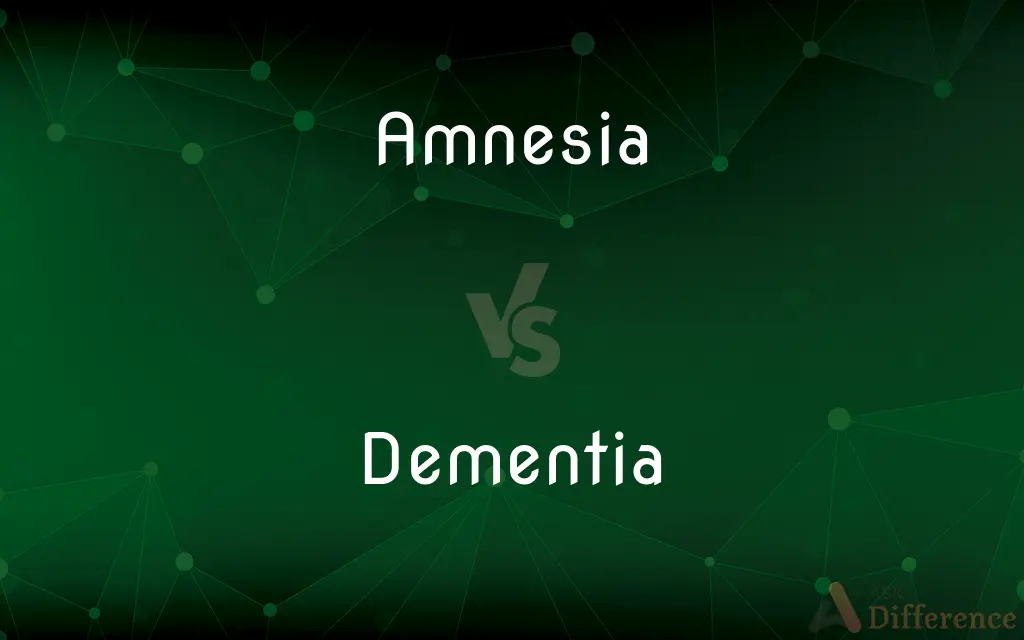Amnesia vs. Dementia — What's the Difference?
By Tayyaba Rehman & Urooj Arif — Updated on March 7, 2024
Amnesia is primarily memory loss, often sudden, due to trauma or illness, while dementia is a progressive decline in cognitive function, affecting memory, thinking, and social abilities.

Difference Between Amnesia and Dementia
Table of Contents
ADVERTISEMENT
Key Differences
Amnesia often results from damage to the hippocampus or related areas, leading to difficulty in forming new memories or recalling past events, whereas dementia, such as Alzheimer's, involves widespread brain deterioration, impacting memory, reasoning, and daily functioning.
While amnesia may have a more abrupt onset and can sometimes be reversible, dementia typically progresses gradually and is irreversible.
Amnesia primarily affects memory, with preserved cognitive abilities, while dementia encompasses memory loss along with impairments in reasoning, language, and attention.
Treatments for amnesia focus on coping strategies and psychological support; in contrast, dementia management includes medications, lifestyle changes, and supportive care to slow progression and manage symptoms.
The impact on daily life differs, amnesia might involve specific memory gaps, whereas dementia leads to broad cognitive impairments, making independent living challenging.
ADVERTISEMENT
Comparison Chart
Definition
Memory loss due to trauma or illness
Progressive cognitive decline
Primary Impact
Memory
Memory, thinking, social abilities
Onset
Often sudden
Gradual
Reversibility
Sometimes reversible
Generally irreversible
Treatment
Coping strategies, psychological support
Medications, lifestyle changes, supportive care
Compare with Definitions
Amnesia
A condition marked by memory loss or inability to form new memories.
After the car accident, she experienced amnesia and couldn't recall her high school years.
Dementia
A group of symptoms affecting memory, thinking, and social abilities severely enough to interfere with daily functioning.
His dementia progressed to the point where he couldn't recognize his own family.
Amnesia
Often results from brain trauma or certain illnesses.
Severe head injuries can lead to temporary or permanent amnesia.
Dementia
Caused by damage to brain cells, often due to diseases like Alzheimer's.
Alzheimer's disease is a common cause of dementia, leading to gradual cognitive decline.
Amnesia
Inability to recall past experiences or learn new information.
He could remember his name but, due to amnesia, not much else.
Dementia
Includes memory loss, confusion, difficulty communicating, and personality changes.
The early signs of dementia included forgetting recent conversations and repetitive questioning.
Amnesia
Focuses on coping strategies and psychological support.
Therapy sessions helped her manage her amnesia and gradually recover some memories.
Dementia
Aims to slow disease progression and manage symptoms, but no cure exists.
Medications for dementia can sometimes slow its progression and improve quality of life.
Amnesia
Can be temporary or permanent, with varying chances of memory recovery.
With proper treatment, some amnesia patients can regain a significant part of their lost memories.
Dementia
Progressive and irreversible, with symptoms worsening over time.
Dementia's progression varies by individual, but it generally leads to increased care needs.
Amnesia
Amnesia is a deficit in memory caused by brain damage or disease, but it can also be caused temporarily by the use of various sedatives and hypnotic drugs. The memory can be either wholly or partially lost due to the extent of damage that was caused.
Dementia
Dementia manifests as a set of related symptoms, which usually surface when the brain is damaged by injury or disease. The symptoms involve progressive impairments to memory, thinking, and behavior, which negatively impact a person's ability to function and carry out everyday activities.
Amnesia
Loss of memory, usually resulting from shock, psychological disturbance, brain injury, or illness.
Dementia
Loss of cognitive abilities, including memory, concentration, communication, planning, and abstract thinking, resulting from brain injury or from a disease such as Alzheimer's disease or Parkinson's disease. It is sometimes accompanied by emotional disturbance and personality changes.
Amnesia
(pathology) Loss of memory; forgetfulness.
Dementia
(pathology) A progressive decline in cognitive function due to damage or disease in the brain beyond what might be expected from normal aging. Areas particularly affected include memory, attention, judgement, language and problem solving.
Amnesia
(figurative) Forgetfulness.
A state of cultural amnesia
Dementia
Madness or insanity.
Amnesia
A potent sativa-dominant strain of marijuana.
Dementia
Insanity; madness; esp. that form which consists in weakness or total loss of thought and reason; mental imbecility; idiocy.
Amnesia
Forgetfulness; also, a defect of speech, from cerebral disease, in which the patient substitutes wrong words or names in the place of those he wishes to employ.
Dementia
Mental deterioration of organic or functional origin
Amnesia
Partial or total loss of memory;
He has a total blackout for events of the evening
Common Curiosities
What are common causes of amnesia?
Common causes include head injuries, severe stress, and certain illnesses affecting the brain.
What is the main difference between amnesia and dementia?
Amnesia primarily involves memory loss, while dementia includes memory loss along with other cognitive impairments.
How does dementia affect daily life?
Dementia significantly impacts daily life, often requiring assistance with basic tasks and activities.
How is dementia diagnosed?
Dementia is diagnosed through a combination of medical history, cognitive tests, and brain imaging.
Are there medications for amnesia?
There are no specific medications for amnesia, but treatments focus on underlying causes and supportive care.
What is anterograde amnesia?
Anterograde amnesia is the inability to form new memories after the onset of the condition.
Is dementia reversible?
Dementia is generally irreversible, with progressive cognitive decline.
What is retrograde amnesia?
Retrograde amnesia involves losing pre-existing memories, often past personal experiences or facts.
What role does therapy play in treating amnesia?
Therapy can help amnesia patients develop coping mechanisms and possibly regain some memories.
Can amnesia be temporary?
Yes, amnesia can be temporary, especially when caused by trauma or stress, and some memories might be recoverable.
Is Alzheimer's the same as dementia?
Alzheimer's is a type of dementia, but not all dementia is due to Alzheimer's disease.
Can lifestyle changes affect dementia?
While they can't cure dementia, certain lifestyle changes can potentially slow its progression.
Can brain exercises prevent dementia?
While brain exercises can't prevent dementia, they may help maintain cognitive function longer.
Can amnesia affect personality?
Amnesia typically doesn't affect personality directly, though the experience can have psychological effects.
How do families cope with dementia?
Families often seek support through caregiving, therapy, and community resources to manage the challenges of dementia.
Share Your Discovery

Previous Comparison
Gallop vs. Canter
Next Comparison
Static vs. DynamicAuthor Spotlight
Written by
Tayyaba RehmanTayyaba Rehman is a distinguished writer, currently serving as a primary contributor to askdifference.com. As a researcher in semantics and etymology, Tayyaba's passion for the complexity of languages and their distinctions has found a perfect home on the platform. Tayyaba delves into the intricacies of language, distinguishing between commonly confused words and phrases, thereby providing clarity for readers worldwide.
Co-written by
Urooj ArifUrooj is a skilled content writer at Ask Difference, known for her exceptional ability to simplify complex topics into engaging and informative content. With a passion for research and a flair for clear, concise writing, she consistently delivers articles that resonate with our diverse audience.















































